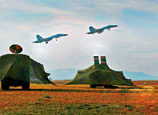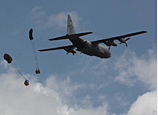
Parties in Iraq must resolutely oppose all terrorist attacks and violence to effectively protect the safety of civilians in order to safeguard and promote the country's stability and development efforts
United Nations Assistance Mission for Iraq (UNAMI) has announced on June 1 that death toll of terror attack and violent conflict in Iraq in May reached 1,045, a new monthly high in nearly five years. Frequent attacks and conflicts have brought the country on the verge of civil war. Deteriorating security situation in Iraq has again aroused widespread concern and worry worldwide.
Terrorist attacks and violence in Iraq have risen rapidly over the past few months, as a direct result of Iraq's intensified sectarian conflict. All along, the conflict between Sunnis and Shiites is one of the most serious challenges in Iraq. After the Iraq war, the long standing religious conflict has undergone new fermentation under realistic conditions and has broken out due to distribution of power issue under the process of national reconstruction.
After the Shiite-led government was established, the Sunni population felt depressed. Since the withdrawal of U.S. troops in Iraq in December 2011, the internal conflicts between Sunnis and Shiites have become more open. The Sunni Vice President Sunni Vice President Tariq al-Hashemi’s fleeing abroad is a proof. Over the past few months, the security situation in Iraq has also deteriorated in this context.
In addition, the "demonstration effect" of Syrian war should not be underestimated. Syria civil war is a main contest between Sunni anti-government forces and Alawi Syrian government. Influenced by the situation in Syria, Iraq's Sunni increasingly tend to resist their dissatisfaction by force.
Escalation of sectarian conflict and expanding influence of terrorist organizations have emerged in Iraq. Local armed forces in Anbar Province are linked with al-Qaeda. As the branch of al-Qaeda in Iraq, "Islamic State of Iraq" is closely related with the "the Syrian Victory Front”, which was listed as a terrorist organization by the U.N. Security Council recently. These extremist forces observe opportunities for kidnap, explosions and other terrorist actions, greatly increasing the security risk in Iraq.
Iraq war broke out 10 years ago and it has been one year and a half since the withdrawal of U.S. troops, but rising security risk is still the biggest obstacle on the path of development in Iraq. Violence in Iraq's internal sectarian trend makes the deepening contradictions, which makes the completion of national political integration even more difficult. At the same time, lack of security also hinders economic construction and makes it hard for the people to get out of the difficult situation in this country.
Regarding the serious casualties caused by terrorist attacks and violence in Iraq, the U.N. Secretary-General Special Representative for Iraq Martin Kobler said Iraqi leaders must act to stop this unacceptable bloodshed. Long-term instability not only puts an end to the country's future but also impacts regional security and stability, and increases the pressure on anti-terrorist worldwide.
Edited and translated by Ma Xi, People's Daily Online
Read the Chinese version: 伊拉克,血腥冲突当止
Source: People's Daily
















 1 killed in SW China helicopter crash
1 killed in SW China helicopter crash


![]()
